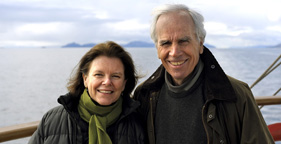Ex clothing execs build national park

Former bosses of Patagonia and North Face accomplish more than many nations to build Patagonia Park in Chile
For 13 years Kris Tompkins had been CEO of Patagonia, the California outdoor apparel company famous for its high-end parkas, eco-activism, and advertisements to shop less.
Starting as an assistant packer at 19 during a college summer, she had figured out whatever needed figuring out when founder and owner Yvon Chouinard’s method for underwriting his hobbies—fly fishing, mountaineering, surfing—became a growing business in the early 1970s.
On her watch, the company more than quadrupled to $120 million-plus in annual revenue. Still, she was restless. "I looked around and I could see the rest of my life. There would always be interesting challenges, but I’d be doing the same thing in 10 years, at 50 and 60. So I took a giant leap of faith."
Douglas Tomkins had likewise dropped out midcareer, having made a name for himself as the co-founder of the North Face and, two decades later, in the 1980s, a fortune with Esprit, the women’s wear brand he built with his first wife. In 1991 he relocated to Chile to purchase the Reñihue farm and 756,000 more acres on the fjord to create his own nature reserve.
He called it Pumalin Park, after the puma, the region’s most charismatic predator. It was there that Kris, then 43, came calling in time for Christmas in December 1993.
Kris and Douglas married in 1994, the second time for both, then embarked on one of the most ambitious private conservation projects on the planet.
Over the past two decades, the two American clothing executives have accomplished more than many nations at establishing a network of new parks, expanding existing ones, and linking them into wildlife "corridors"—a continuous habitat that reflects migratory patterns and animals’ range rather than lines on a map. They’ve financed much of this with their own fortunes. In all, they’ve conserved nearly 2.2 million acres across the Patagonia region and won national park status for three parks, in Argentina and Chile, that didn’t exist before they got involved. They’ve spearheaded the reintroduction of endangered species—giant anteaters, Pampas deer—in programs watched by wildlife biologists around the world. Jaguars are next.
"What they have done, it is not at all easy to do," says M. Sanjayan, the former chief scientist at the Nature Conservancy who now is at Conservation International. "Some will say oh, if you have the money, you just buy the property and put a fence around it. But you have to be politically savvy, legally savvy, and people-savvy to keep it saved."
"They make an incredible team," says their friend Tom Brokaw, the former NBC news anchor. "With Doug—social skills are not his strength. But among those I know, no one is bolder at acting on his imagination. And Kris knows how to communicate his vision." Theirs is not a case of the great-woman-behind-the-great-man, Brokaw says: "They are each strong leaders, with different styles."
Later this year the two plan to open Patagonia Park in Chile, the crown jewel of their park-making efforts. The intention is to invite the public with a grand opening in December and pursue formal national park status in the years ahead. And this one really is Kris’s baby. In 2004 she used $1.7 million of her own equity from Patagonia in the purchase of the Estancia Valle Chacabuco, a ranch of historical significance in the Aysén district. Combined with adjacent parcels, it spans nearly 200,000 acres. Despite the recession, she and Conservacion Patagonica, the nonprofit foundation that endows and manages the park, have raised and invested about $45.5 million in the park’s infrastructure, soft-launching a well-appointed eco-lodge in 2011. On top of three new trails, the park-in-progress offers white-water rafting, fly fishing, and a chance to closely observe pink flamingos and guanacos, which look like llamas with camel necks and are innately comical. Several travel magazines have already gushed about it. Bruce Babbitt, the U.S. secretary of Interior under Bill Clinton, has given it the equivalent of a dust jacket rave, predicting that it "will be the Yellowstone of South America."
Patagonia Park has also become a lightning rod for local grievances. In the transition from cattle and sheep to tourism, local leaders say, the park has cost the region jobs, left rancher families destitute, and driven up prices on livestock. Much as American ranchers fight the reintroduction of wolves in Wyoming, the Tompkinses’ critics also say that studying pumas, rather than killing them, has led to livestock losses on bordering properties. Moreover, locals and even foreign academics lament that in their zeal to protect wildlife, the Tompkinses will drive the gauchos, the cowboys of Patagonia, into cultural extinction.
For more info:http:// http://www.tompkinsconservation.org/
Valere Tjolle
Special Earth Day £25/€30/$42 Green Tourism Offer HERE
Source: BUSINESSWEEK
 United Kingdom
United Kingdom United States
United States Asia Pacific
Asia Pacific












































Dozens fall ill in P&O Cruises ship outbreak
Boy falls to death on cruise ship
Turkish Airlines flight in emergency landing after pilot dies
Unexpected wave rocks cruise ship
Woman dies after going overboard in English Channel